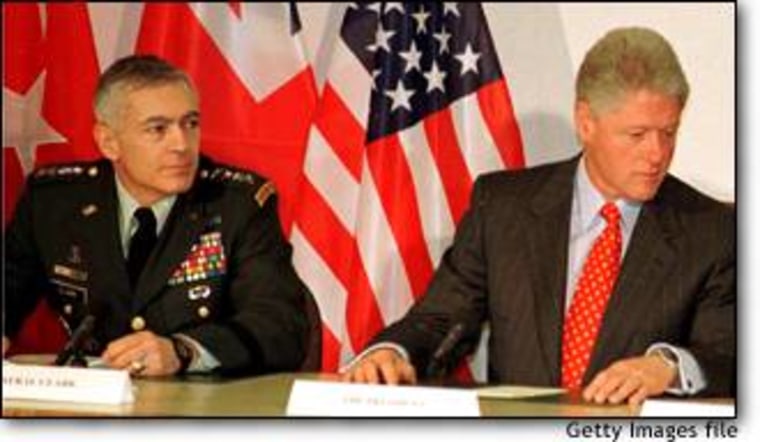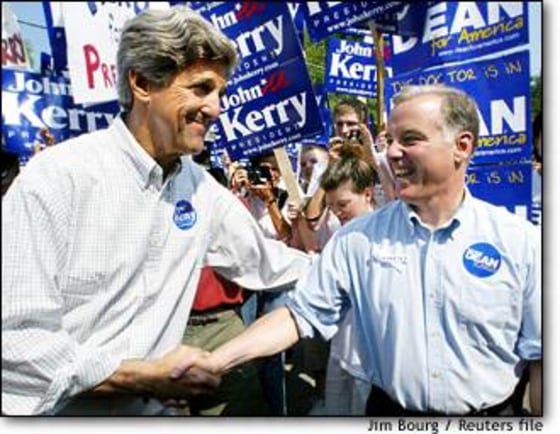Democratic presidential front-runner Howard Dean and Massachusetts Sen. John Kerry are squaring off in an increasingly bruising battle to win the Jan. 27 New Hampshire primary, which would give one of them a big, perhaps decisive, boost toward becoming the Democratic nominee. Can Kerry — now trailing Dean in New Hampshire polls — become the “comeback kid” of 2004 just as Bill Clinton was in the 1992 primary?
In a weekend of campaigning here, Kerry and his aides sharpened their attacks on Dean. Kerry is making the former Vermont governor’s proposal to rescind the tax cuts enacted in 2001 and 2003 a focal point of his campaign.
Getting rid of middle-class tax cuts is “bad economics and it’s bad social policy,” Kerry said in an appearance in Claremont, N.H. Saturday. “A large part of it is the Democrat tax cut. We’re the ones who fought to put the 10 percent bracket in place. You want to take the 10 percent bracket away from people? We’re the ones who fought to put the child credit increase in. You want to tell a family of $40,000 of income, ‘We’re taking your child credit for two children. That’s going to cost you an extra $1,000 a year.’”
Kerry snapped, “Last time I looked, the problem in America was not that the middle class has too much money.”
In Claremont, Kerry was more animated than in his recent televised debate performances. His intensity seemed to reflect a recognition in his camp that the time had come to tackle Dean and bring him to the ground.
“By Columbus Day, you’ll see contrast ads on TV here, earlier than ever before,” predicted pollster Rich Killion, director of the Fitzwater Center at Franklin Pierce College in Rindge, N.H. “They’re going to go after each other on credibility.”
Kerry opened himself to attacks on three crucial votes: for the Iraq war resolution, for the USA Patriot Act and for “No Child Left Behind Act.”
Killion suggested the possibility that Kerry and Dean could “raise each other’s negatives significantly but freeze themselves in place” in polls, opening the way for another contender to win disenchanted or uncommitted voters.
Dean continues to insist that the tax cuts did not benefit middle-class families.
“The fact is that there aren’t any middle-class tax cuts,” Dean said in New Hampshire last Thursday. “What the president did was not really cut taxes for middle-class people at all. He increased your expenses and cut your services.”
Dean contends that college tuitions have gone up and school districts have raised property taxes in order to pay for federally mandated programs such as special education and the tests required by the “No Child Left Behind Act.”
But Dean hinted late last week that he’ll offer something to middle-class voters.
“We can have middle-class tax fairness. We’ll show you how to do that in a few weeks,” he promised at a stop in Londonderry on Thursday.
Pressed by reporters for details, Dean said, “you’re going to have to be patient,” but his aides said Dean’s soon-to-be-unveiled economic blueprint may include proposals for making the tax code fairer for middle-income taxpayers.
“Dean is going to have to flip-flop again,” said Billy Shaheen, the New Hampshire chairman of the Kerry campaign and the husband of ex-governor Jeanne Shaheen.
At the start of the year, Kerry appeared to be comfortably ahead in New Hampshire polls, but that strength was illusory, based as it was based on name recognition. Kerry has served as a Massachusetts senator for nearly 20 years and the vast majority of New Hampshire’s population lives in the southern part of the state within 30 miles of Massachusetts.
In recent polls and according to reports from county chairmen, Dean has edged ahead of Kerry, but operatives for some of the campaigns and party activists say support is fluid and predict that many voters will change their minds a few times before Jan. 27.
“The undecideds in every poll up here are about a third, which is fascinating because this race has not suffered from a lack of interest,” said Killion.
Billy Shaheen, who served as state chairman for the 2000 Gore campaign, helping push him to victory over Bill Bradley, told MSNBC.com that Kerry’s underdog status reminded him of the 2000 race. “I’ve been here before, four years ago. At the beginning of the summer, Al Gore was 20 points up, at the end of the summer we were 20 points down and we fought our way back. We’re only 10 points down, that’s not bad.”
Kerry and Dean have the most extensive field operations in the state, each with 10 regional offices. Dean builds on his “ground game” with relentless campaigning across the state, as he has done for more than a year.
“Gov. Dean has the ability to be here all the time because he doesn’t have a job to go to,” said Shaheen.
Dean refuses to elevate Kerry by agreeing to a one-on-one debate. “Why should I choose him instead of Dick Gephardt or Joe Lieberman or Dennis Kucinich?” Dean told a woman in Londonderry who asked why he wouldn’t agree to face Kerry one-on-one. “I don’t get to pick my opponent.”
Then he added, “If I wanted to, I could say ‘OK, I’m going to debate with Carol Moseley Braun,’” the former Illinois senator who is a statistical dot in New Hampshire polls.
Dean is sounding ever more confident that he’ll win the nomination, be elected president, and get a running start at governing even before taking the oath of office.
“As president-elect, I will go to Europe and meet with the premiers and presidents over there,” he told an audience in Berlin, N.H., Friday.

Retired Gen. Wesley Clark, who parachuted into the race last week, has sparked interest. “There are a lot of Democrats who think if you have a general standing there next to Bush (in a televised debate), he’s going to be able to wipe out Bush,” said Beth Arsenault, the Belknap County chairwoman, who is uncommitted.
George Bruno, Clark’s most prominent New Hampshire sponsor told MSNBC.com. “We’ve got an organization in place. It’s called the Draft Clark movement. They have a strong organization in New Hampshire. We’re going to rely on the draft movement as our base and build from there.”
“I don’t think he has a huge amount of time,” said Arsenault. “He’s got to get his policies out there in the next two or three weeks.”
Clark is off to a wobbly start with his contradictory statements on whether he’d have voted for the congressional resolution authorizing President Bush to invade Iraq.
As for the other contenders, one could stun the political professionals by pulling off an upset, but at this point, that appears to be a 50-1 bet.
In approximate order of how much support and organization they have in New Hampshire, the other Democrats are:
Missouri Rep. Dick Gephardt: Much admired and with some support among older voters for his staunch support for Medicare, Gephardt will be a factor, especially if he bounces in to New Hampshire after winning the Jan. 19 Iowa caucuses.
North Carolina Sen. John Edwards: “Edwards had a strong start here, then it feels like he disappeared for a while, but I think there’s still a lot of curiosity out there for him,” said Dean’s New Hampshire director, Karen Hicks.
“I’m not particularly optimistic that he’s going to climb further in the polls, he’s really put in a huge amount of effort in the last month,” said Arsenault, and yet has not moved up to double digits in the polls.
Connecticut Sen. Joe Lieberman: His strategy focuses more on the Feb. 3 contests in Delaware, South Carolina, Arizona, Oklahoma, Missouri and New Mexico. Lieberman has been campaigning in the Granite State but is not likely to place higher than third.
“I don’t know anyone that is supporting him, possibly because he is the most Republican-like of all of them,” said Arsenault.
The rest of the pack: Moseley Braun, Ohio Rep. Dennis Kucinich, Florida Sen. Bob Graham, and Al Sharpton lack the field organizers and word-of-mouth excitement to have a big impact on the race in this state.
